Do you remember the Susan B. Anthony dollar coins? They came out both in 1979 & 1999 for only a short time because the public resisted them. They appeared indistinguishable from quarters. So what was worth $1 was seen as no different than what was worth only 25 cents. When Christians lose their sense of holiness, & live no differently than everyone else in the world, unbelievers resist them. The perceived worth of their faith is rejected.
The only time we speak of holiness today is when it’s used as a flippant exclamation: holy smokes, holy cow, holy moly, holy Toledo, or something more crude. To call anything “holy” really means that it’s separated to, or comes from, God. Whatever’s holy belongs to God. So, do you really want to throw that very serious word around so carelessly?
God is holy, but me? In our natural state, we’re unholy. All are sinful & fall short of His glory (Rom. 3:10-11, 23). We often have self-inflated views of our goodness as we compare ourselves with others on the relativity scale of goodness. We overemphasize our goodness & underemphasize our badness. But God sees deeper than our outward behaviors to our inner thoughts, desires, motives, & intents.
We assume God grades on the curve. But Jesus is the curve buster—the only one who has ever lived a completely holy life, which qualified Him to die in our place so that his holiness could be “reckoned” to us (2 Cor. 5:21). When we’re in Christ, we belong to God! We’re accounted as holy because we’re forgiven (Heb. 10:10). We’re called “saints” because we’re set apart to Him (Rom. 1:7). He covers us with His holiness, & fills us with the Holy Spirit to empower us to live in holiness (Gal. 5:16-17). So, in Christ we’re considered sinless, & then the Spirit helps us sin less & less & less—which is the ongoing process of sanctification (1 Thess. 5:23). God expects us to be holy as He is, which means moral perfection (1 Pet. 1:16, Matt. 5:48).
The Pharisees derived their name from the Hebrew word, which means “separated.” They were determined to maintain their distinctiveness as Jews from the pagans around them. That was commendable, but they took it to an extreme by avoiding any kind of Gentile contact for fear of defilement. So when Jesus would associate with “sinners” they accused Him of guilt by association (Luke 7:34).
When we think of ourselves as “holier-than-thou,” we become like those self-righteous Pharisees. Jesus condemned such pretentious piety when he told the story of the Pharisee & the tax collector praying (Luke 18:9-14). The humble sinner who confessed his need for grace was justified before God over the pompous Pharisee who had contempt for others not as holy as he. “Pious” used to be a good word to describe godly people. But to call someone “pious” today is an insult.
Jesus didn’t keep company with sinful people because He approved of their behavior, let alone participate in it. Jesus lived differently, but not in a weird, off-putting way. We all yearn to fit in. We think it’s ok to be a little different, but not too different, which ends up making us barely indistinguishable from the rest of the world. Many Christians have a kind of cultural holiness & moral mediocrity that’s measured by the relative holiness of other Christians around them instead of by the holiness of God.
Such people live as spiritual chameleons who change character depending on the environment & company they’re in at the moment. They hold the same basic materialistic goals, absorb the same filthy entertainment, laugh at the same dirty jokes, do the same inappropriate internet searches & scrolls, use the same profane language (just less), & cut the same ethical corners in business transactions.
When you gave your life to Christ, changes should begin (2 Cor. 5:14-17). It’s a supernatural thing when we submit to the Holy Spirit. Whatever degree of holiness we attain is only possible through God working in our lives by His grace (Titus 2:11-12). But we have to work in cooperation with Him by utilizing the resources He’s provided in prayer, Scripture, & the Church.
We all need to gather weekly with other believers for fellowship, prayer, communion & teaching (Acts 2:42). We need to pray regularly for holiness, inviting Him to make needed changes (Col. 1:9-11). We read Scripture to be trained in righteousness (2 Tim. 3:16-17). It takes discipline to develop this habit of spending this time with God, but there’s no other way to grow in holiness.
Because God wants us to walk in obedience, we have to take sin seriously (1 Thess. 4:7-8). We cultivate the same hatred for sin that God has. Instead of excusing or justifying it, we take responsibility for disciplining our minds & bodies. We run all thoughts & actions through these filtering questions: “Is this pleasing to God? Will I live by what Scripture teaches? Am I willing to give up this activity that’s keeping me from holiness?”
You can’t continue to live under sin’s dominion. It will be a daily battle to make the choices on what to say “no” to & “yes” to (Rom. 7). But remember your baptism—you died to sin & united with Christ in His resurrection to new life, & you can do all things through Him who strengthens you (Rom. 6, Phil. 4:13).


